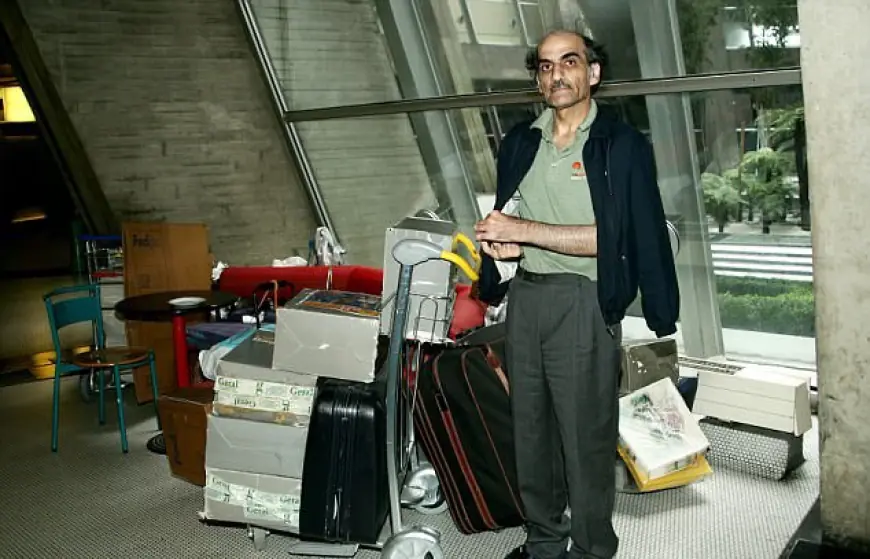Nasseri's Odyssey: 18 Years Inside an Airport
“Discover the life of Mehran Nasseri, who lived in an airport for 18 years. A tale of resilience and identity.”

Mehran Karimi Nasseri: The Man Who Called an Airport Home
Introduction
In a world where airports are merely transitory spaces, Mehran Karimi Nasseri’s story stands out as a poignant tale of a man whose life unfolded in the liminal corridors of Charles de Gaulle Airport. His extraordinary 18-year residence in Terminal 1 turned him into an urban legend, inspiring cinematic portrayals and bringing attention to the complexities of statelessness and human rights.
Early Life and Journey to Statelessness
Mehran Karimi Nasseri was born in 1945 in Masjed Soleiman, Iran, into a life of relative comfort. His journey towards statelessness began with his alleged expulsion from Iran in 1977 due to his political protests against the Shah. This led to a tumultuous quest for asylum, which saw Nasseri traverse multiple countries and legal hurdles, only to find himself in a bureaucratic purgatory.
The Terminal Years
In 1988, Nasseri’s life took a Kafkaesque turn when he claimed to have lost his refugee documents en route to England. This incident trapped him in Charles de Gaulle Airport without the legal means to enter France or travel elsewhere. His existence in the airport was marked by the mundane routines of daily survival and the extraordinary resilience of the human spirit.
Life in Limbo
Nasseri’s time at the airport was not just a period of waiting; it was a life lived in full view of thousands of travelers. He became a fixture of Terminal 1, his story a curious anomaly in the bustling transit hub. His days were spent reading, writing, and engaging with the world from his unique vantage point.
The Legal Labyrinth
The legal complexities surrounding Nasseri’s situation were as intricate as they were frustrating. Despite efforts by human rights lawyers and the eventual issuance of travel documents by Belgium, Nasseri remained in the airport, a man caught between nations.
Cultural Impact and Legacy
Nasseri’s ordeal resonated with the public, inspiring films like “The Terminal” and highlighting the plight of stateless individuals. His life challenges our understanding of belonging and identity in an increasingly globalized world.
The World Beyond Terminal 1
While Nasseri’s life was confined to the airport, the world outside continued to evolve. His story became a symbol of the transient nature of modern life and the invisible borders that can trap individuals in unexpected ways.
The Psychological Toll
Living in an airport for nearly two decades undoubtedly took a psychological toll on Nasseri. The constant flux of travelers juxtaposed with his static existence created a surreal environment that challenged his mental health.
The Community’s Response
Nasseri’s presence at the airport was not unnoticed by the community. Airport staff, fellow travelers, and even the media formed a makeshift community around him. Some offered help, while others simply shared a moment of their journey with him.
The End of an Era
In 2006, Nasseri’s airport residency came to an end when he was hospitalized and later moved to a shelter in Paris. This transition marked the end of an era and the beginning of a new chapter in his life.
Reflections on Home and Identity
Nasseri’s experience raises profound questions about what it means to have a home and an identity. His life challenges the notion of nationality and the value we place on legal documents in defining who we are.
The Future of Stateless Individuals
Nasseri’s story is not unique. Many stateless individuals around the world face similar challenges. His experience highlights the need for international cooperation to address the issue of statelessness and ensure that everyone has the right to a nationality.
Conclusion
Mehran Karimi Nasseri’s life story is a testament to the indomitable human spirit and the complexities of modern geopolitics. His 18 years at Charles de Gaulle Airport serve as a reminder of the thin line between home and exile, belonging and isolation.
It is a powerful narrative that encapsulates human resilience and the complexities of identity in a globalized world. It serves as a reminder of the importance of compassion and the universal human right to belong.
What's Your Reaction?







































